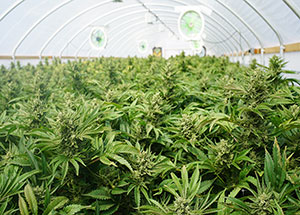
A lot of recreational marijuana is waiting in the wings while state and local officials iron out the regulatory details involved in getting the product from the producer to the consumer.
By Ian Erlichman
Despite recreational marijuana’s 68 percent approval rating in Somerville, its dispensaries must wait several months until sales begin, says Doug Kress, Director of Health and Human services.
“We have growers that have been approved, but we don’t have the testing facilities,” stated Director Kress, “and there have been no applicants that have come forward as of yet.” However, if a marijuana testing facility were to come online today, Somerville residents would still have to wait several months to buy recreationally, according to Director Kress.
When recreational dispensaries do eventually appear in Somerville, they may pop up in small corner stores, said Kress. But dispensaries won’t be hidden. For safety reasons “they must be public, where people can see.” Although the dispensaries will be placed in public settings, regulations bar them from selling within 500 feet of a school.
In that vein, Somerville’s Health and Human Services board has emphasized the importance of curbing marijuana marketing, directed at the youth, with a heavy regulatory focus on cannabis infused gummies. The CCC has outlawed gummies shaped like flowers and animals and allows only neutral packaging and “non-descript shapes,” says board member Robert Ciccia.
In the age of information, marijuana marketers appear to have more platforms available for advertisement than the substances of years past. An app called “Weedmaps” allows users to locate nearby marijuana dispensaries and exists as an unregulated avenue for marijuana companies to advertise product, says Chairman Brian Green. “Who’s regulating them?” Kress asks.
For those over 21, Edible marijuana presents regulators with slew of legal challenges not seen in other forms of consumption. “There is no breathalyzer for marijuana,” as one board member mentioned. Although police officers are trained to notice behavioral patterns of marijuana users, with no smell and no conclusive test, driving while high may result in negligible legal penalties. “The only way to do it is a blood test,” confirms director Kress.
However, according to research published in the journal of Clinic Chemistry, blood tests are an ineffective way to measure THC levels. Because THC degrades quickly in the body, blood tests conducted several hours after driving will show THC levels much lower than were present at the time of driving.
Similarly, driving impairment might be accidental because of edible marijuana’s delayed affects. If a user ingests an edible they might feel fine “for the next five minutes,” quipped Chairman Green, but “if traffic hits,” the effects could become precipitously more intense while the user is still driving.
Despite the challenges, regulating a market as pervasive as marijuana is not without its benefits. In other recreational states, like Washington, $1.3 billion was raised as of 2017 from the adult marijuana market.
Massachusetts, and Somerville in particular, is looking to draft social benefits behind the growing wake of the recreational weed market. According to its website, the Cannabis Control Commission (CCC) has developed a “Positive Impact and Diversity Plan” that will kick back benefits to communities that “have previously been disproportionately harmed by marijuana prohibition and enforcement” and promises to “positively impact those communities.”
There will also be educational benefits as “some of the profit that these places generate have to go into education,” said Chairman Green.
On the user end, regulated cannabis will ensure a safer high, free from the risk of synthetic cannabinoids and laced chemicals. This fact, the board hopes, will draw customers away from the black market, despite the price differential that excise taxes are expected to create.
Still, no dispensaries can open until a testing facility is licensed in Somerville. The City of Somerville is incentivizing residents to participate in the market by giving them priority licensing over outside entrepreneurs.
“An enterprising person would take advantage of this market vacuum,” suggested board member Ciccia. And once there is a running dispensary, we expect to see a lot of success, confirmed Director Kress.
To learn more about the testing facility application, visit the CCC’s website at https://mass-cannabis-control.com, or stop in at the next Board of Health and Human Services Meeting on August 16. If you or someone you know is interested in entering the recreational market, Farm Bug, a local marijuana farming cooperative, has summarized recent marijuana legislation and license prices for easy reading at masscann.org.
















Why wouldn’t some of the money from recreational marijuana go to help fund addiction services?
Ian, it is not required by the state that any testing labs be opened in Somerville…they can be opened anywhere in the state just like they are for medical testing. They just need to be licensed for adult use applications by the CCC.
Best, Keith
CEO Revolutionary Clinics
67 Broadway, Somerville, MA
Recreational marijuana will be taxed upwards of 20% (17% to State, 3% to City). It’s safe to say that some of those will be allocated for addiction services. Services desperately needed due to big pharma companies using humans as guinea pigs for their narcotic creations.
Meanwhile you can still walk into any number of bars in Somerville and get drunk out of your mind